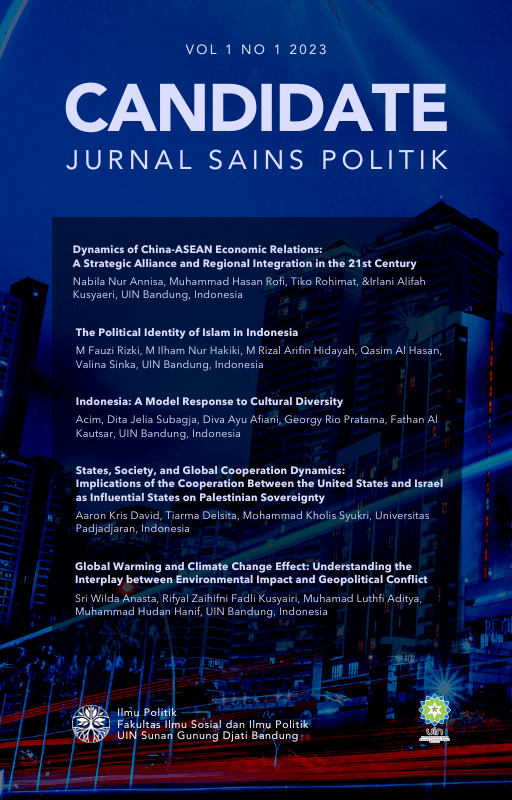The Political Identity of Islam in Indonesia
Keywords:
Identity politics, Islam, politics, political eliteAbstract
This study focuses on the phenomenon of Islamic identity politics. This phenomenon is common in Indonesia because Indonesia is Muslim in that it has the largest population. The purpose of this study is to explain how Islamic identity politics is widespread in Indonesia's political struggle over majority elections. The method used is a qualitative research method or a literature search. Studies show that Islamic identity politics has historically arisen from multiple groups competing to emphasize their existence. The feeling that Indonesia is dominated by Islam, which highlights the intersection of nationalism and religious groups, is fundamentally different from the concept of the state where Pancasila is the supremacy of the state, and thinks that religion is set aside. And that is the issue of identity politics. Another insight explains that the political elite approaches religious figures before the campaign to gain a majority vote to gain power. From this we can conclude that Islam's political identity will continue to be encountered by the general public, either on a daily basis or with some dynamics. The recommendations of this study are that every human being should have a unique identity, which should be a cohesive element, which is in the interests of the political elite to make propaganda and election interests. It means that it should only be used.References
Abdullah, A. (2017). Membaca Komunikasi Politik Gerakan Aksi Bela Islam 212: Antara Politik Identitas dan Ijtihad Politik Alternatif. An-Nida', 41(2), 202-212.
Anam, H. F. (2019). Politik Identitas Islam dan Pengaruhnya Terhadap Demokrasi di Indonesia. Jurnal Pemikiran Politik Islam, POLITEA, 2(2).
Asy’ari, H. (2018). Renaisans Eropa dan Transmisi Keilmuan Islam ke Eropa. JUSPI (Jurnal Sejarah Peradaban Islam), 2(1), 1. https://doi.org/10.30829/j.v2i1.1792
Berutu, A. G. (2019). Islam Di Eropa. 1–11.
Boix, C., & Stokes, S. C. (2021). Identitas Nasional: Handbook Perbandingan Politik. Bandung: Nusamedia.
Budiarjo, M. (2008). Dasar-Dasar Ilmu Politik. Jakarta: Gramedia Pustaka Utama.
Deleuze, G. (2002). Filsafat Nietzsche. Yogyakarta: Ikon Teralitera.
Foucault, M., & Chomsky, N. (2020). Tentang Kodrat Manusia: Keadilan vs Kekuasaan. Yogyakarta: Penerbit Independen.
G john ikenberry. (n.d.). Amerika dan Dunia Baru, Mem. yayasan penyunting obor indonesia.
Gerung, R. (2008). Kita dan Politik . In B. Takwin, D. Hutagalung, E. S. Riyadi, R. Rober, T. Doludea, & R. Gerung, Kembalinya Politik: Pemikiran Politik Kontemporer dari [A]rendt sampai [Z}izek (pp. V-XXI). Jakarta: Marjin Kiri & Perhimpunan Pendidikan Demokrasi.
Kusumastuti, A., & Khoiron, A. M. (2019). Metode Penelitian Kualitatif. Semarang: LPSP.
Lestari, Y. S. (2018). Politik Identitas di Indonesia: Antara Nasionalisme dan Agama. Journal of Politics and Policy, 1(1), 19–30.
Mansbach, R. W., & Rafferty, K. L. (2021). Politik Identitas: Nasionalisme dan Entitas. Bandung: Nusamedia.
Mustapa, H. (2019, juli 3). Politik Parawisata Daerah dalam Perspektif Civil Society. POLITICON: Jurnal Ilmu Politik Vol. 1, pp. 24-50.
Muthohirin, N. (2019). Politik Identitas Islam dan Urgensi Pendidikan Multikultural. J-PAI: Jurnal Pendidikan Agama Islam, 6(1).
PIPUNPAR. (2019, Desember 13). Problem Identitas - Prof. Dr. Ignatius Bambang Sugiharto. Retrieved from Youtube.com: https://youtu.be/QuU6plA9EE
Takwin, B. (2011). Etika Politik: menimbang Ulang. In S. Wibowo, F. b. Hardiman, R. Robet, & T. H. Tjaya, Empat Esai Etika Politik (pp. vii-xxii). Jakarta: TINTA creative.
Wahid, A. (2006). Islamku islam anda islam kita. Islamku Islam Anda Islam Kita, 451.
Zarkasyi, H. F. (2018). Konsep Din Al-Islam. Islamia Vol. 21 No. 1, 17-26.
Zarkasyi, H. F. (2020). Minhaj: Berislam, dari Ritual hingga Intelektual . Jakarta : INSISTS.
Downloads
Published
How to Cite
Issue
Section
License
Authors who publish with this journal agree to the following terms:
- Authors retain copyright and grant the journal right of first publication with the work simultaneously licensed under a Creative Commons Attribution-ShareAlike 4.0 International License that allows others to share the work with an acknowledgment of the work's authorship and initial publication in this journal.
- Authors are able to enter into separate, additional contractual arrangements for the non-exclusive distribution of the journal's published version of the work (e.g., post it to an institutional repository or publish it in a book), with an acknowledgment of its initial publication in this journal.
- Authors are permitted and encouraged to post their work online (e.g., in institutional repositories or on their website) prior to and during the submission process, as it can lead to productive exchanges, as well as earlier and greater citation of published work (See The Effect of Open Access).





.jpg)



